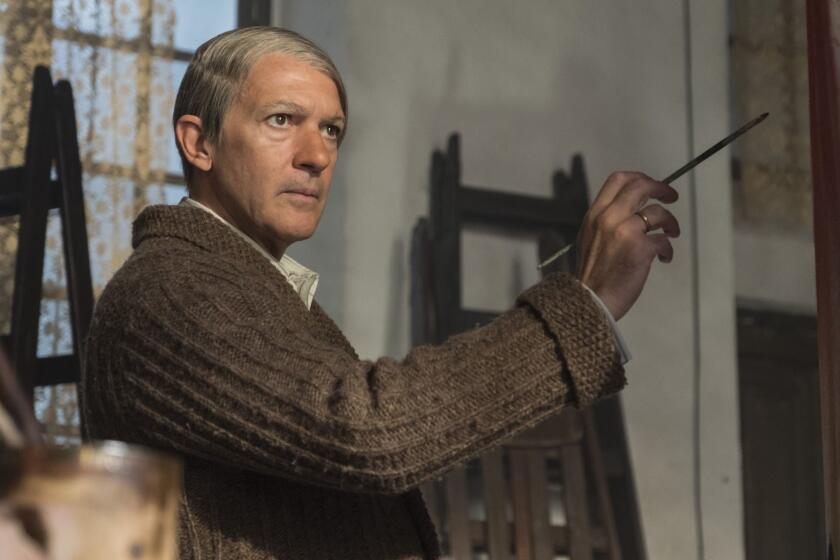Review: ‘Genius: Aretha’ respects Franklin’s music. But there’s nothing like the real thing
- Share via
Three years after its previous installment, the third edition of National Geographic’s “Genius” series finally arrives Sunday. Like the two first chapters, which traced the lives of Einstein and Picasso, it focuses on a person recognized by a single name: Aretha, as in Franklin, with Cynthia Erivo in the title role. Unlike those figures, synonymous with science and art, she is Black, a woman and a musician, which brings some fresh ideas to the table. The story resonates with current social concerns and conversations, plus it has a good beat, as the kids on “American Bandstand” were said to say, and you can dance to it. Literally.
From showrunner Suzan-Lori Parks, who won the Pulitzer Prize for drama in 2002 for “Topdog/Underdog” and scripted the 2019 television adaptation of Richard Wright’s “Native Son” and this year’s “The United States vs. Billie Holiday,” it’s an informative, at times illuminating — if also sketchy and in some respects superficial — jog through the life of the woman crowned the Queen of Soul by a Chicago disc jockey in 1967, a crown she never took off, however much public tastes and the music business changed around her: American royalty.
As in the earlier seasons, the story jumps around in time, which keeps Erivo onstage even as young Aretha (the excellent Shaian Jordan) hones her chops singing gospel in her father’s church and traveling gospel show, but also allows the filmmakers to hold back dramatic childhood incidents until later episodes. (There were plenty of those in Franklin’s life; she had two children, by different fathers, by the time she was 15.) At the same time, the atomized structure, especially spread over several hours — I have seen seven of eight episodes — tends to interfere with dramatic momentum and accentuate the fact that the story plays out in short expository scenes. Some of these do have their pleasures, but all in all, the text is more declarative than conversational, whether the subject is political or personal — unlike, say, Regina King’s film of Kemp Powers’ play “One Night in Miami,” which puts Malcolm X, Cassius Clay, Jim Brown and Sam Cooke in a room and on a roof for a couple hours to triangulate a moment in Black history and manhood.
“What kind of music do you really want to make, Miss Franklin?” Atlantic Records’ co-owner and producer, Jerry Wexler (David Cross), asks at the beginning of their relationship.
“I want to make hits, Mr. Wexler,” Aretha replies, having already spent years without any on Columbia Records.
“You’ll get there when you recognize you’re Aretha Franklin and nobody else.” Once she does, they will make many hits together.
After scoring raves for ‘The Color Purple’ and ‘Harriet,’ Erivo takes on her most challenging assignment to date: playing Aretha Franklin in NatGeo’s ‘Genius.’
Unlike most show business biographies, in which an artist climbs from obscurity to fame and tragedy ultimately gives way to triumph, tragedy and triumph keep pace with one another here, as Aretha’s career and personal life, to quote a song she sings, go up, down, all around, like a seesaw. Labels and producers come and go; drink becomes a problem; relationships pop and fizzle. Family members fall out, then fall back in, then out and in and out and in, which — to judge by the testimony of her brother (Cecil, played here by Steven Norfleet), who would come to manage her, and sisters (Erma and Carolyn, played by Patrice Covington and Rebecca Naomi Jones, respectively), who were also singers — does seem to have been the actual pattern, family always winning out in the end. But it can be a little wearying. (David Ritz’s “Respect: The Life of Aretha Franklin” is a sympathetic but clear-eyed reference for those who want to know more.)
Hoping to be cast in a film about Bessie Smith, she notes, “Bessie was a woman who was surrounded by men who were calling the shots,” a position she finds familiar, and which “Genius” makes central to its drama. There is much pushing back at or caving in to or smoldering silently over men who want to tell her what to do, or whom she thinks are telling her what to do, including abusive first husband and manager Ted White (Malcolm Barrett) and Wexler. The latter is made to grumble over some of her choices, weirdly asking, “How political is she going to get?” as she’s recording Elton John’s “Border Song,” and to resist giving her a producer’s credit. (“I might fire you, Jerry, so I can do whatever the hell I want… You don’t own me. And I’m free. You hear me? I am free.” ) But they are really friends, and Aretha is rarely without agency; if she doesn’t always get what she wants, no one actually manages to tell her what to do.
Her main beefs are with her father, the Rev. C.L. Franklin (Courtney B. Vance), a superstar preacher, civil rights activist and nighttime party animal, who fathered a girl with a 12-year congregant while married to Aretha’s mother, Barbara (an affecting Antonique Smith). (Ray Charles described the 1950s gospel circuit as a “sex circus.”) He’s represented as perhaps too concerned with exploiting his daughter’s fame, but also resentful and jealous; he’ll get competitive with the Rev. Martin Luther King Jr. (Ethan Henry) over whose benefits Aretha’s going to play. (“Aretha don’t do nothin’ without my say-so,” he’ll say, long after she has stopped worrying about his say-so.) But parallels are also drawn between C.L. Franklin’s rising stardom — “He’ll belong to the world,” his wife is told in one flashback — and Aretha’s.
Actors seem to enjoy playing amazing real people of history; they are the Hamlets and Lears of pop culture, a gateway to Emmys and Oscars and Golden Globes. Still, the representation of genius is by its nature fraught, because as talented as an actor may be, she or he can only hint at what made their character unique. Erivo, a Tony winner for the 2015 revival of the musical “The Color Purple,” is a marvelous singer — she hits every note she intends to, with precision and force and feeling. But in trading what makes Cynthia Erivo Cynthia Erivo for an approximation of what made Aretha Aretha, she is also acting here as something of a forger, a shadow in Plato’s cave.
For the second season of their National Geographic Channel anthology series “Genius,” showrunner Ken Biller and producers Ron Howard and Brian Grazer turn their attention from Albert Einstein to Pablo Picasso.
Still, there’s nothing to criticize in her performance, and she’s very fine in the series’ nonmusical moments as well. Family and friends and collaborators describe Franklin as shy, reserved, opaque and private, and Erivo pitches her performance accordingly — she’s quiet and contained when not at work and serious off the job and on. There are some blowups along the way, but they are relatively subdued and comparatively few over the several hours, especially given how often Aretha is not getting along with some other character.
The extended length of the series does mean that the musical numbers can run at length; you get songs, rather than snippets, and the fact that much of the music was performed live is a great asset; the legacy of these songs — “Respect” and “Rock Steady” and “Chain of Fools” and a heaping helping of gospel — are why this series exists in the first place. Director Anthony Hemingway shows some welcome interest in what musicians do as they’re getting ready to play, even if the studio chatter doesn’t always sound authentic. (Musician One: “She writes our parts, and she can’t even write music.” Musician Two: “Just like Charles Mingus.”) Close attention has been paid to re-creating the costumes and backdrops of the singer’s television and concert appearances, though the venues can seem somewhat small and underpopulated, either as a function of the budget or COVID-19 — the production was halted when the pandemic began and resumed in late 2020.
Franklin had hoped to see a film of her life made, and this year she’s getting two: The theatrical feature “Respect,” with which she was involved before her death in 2018, is set to arrive in August, with Jennifer Hudson as Aretha and Marc Maron as Wexler. Given her tendency to paint in rosy terms a life that by all accounts but her own was rife with emotional hardship, she probably would not enjoy “Genius.” But it generally agrees with the record.
Although we are told repeatedly that she is special, nothing here really “explains” Franklin’s genius. (One might say that she was a natural artist with an appetite for commercial success, often for better and sometimes for worse, though the accent here is very much on the better.) But you know it when you hear it, and the music Franklin made is out there waiting.
A number of performances reproduced in “Genius” are just a click away on the Internet, including a stunning reading of the standard “Skylark,” one of the high points of her Columbia years, on Steve Allen’s “Tonight Show”; the 1968 “Legendary Concertgebouw Concert” in Amsterdam; her 1971 Fillmore West date; and the 1972 gospel concert that produced the album (and recently completed documentary) “Amazing Grace.” I don’t know if “Genius” plans to re-create her deep and moving performance of “(You Make Me Feel Like) A Natural Woman,” at the Kennedy Center in 2015, before President and Mrs. Obama and Carole King, who wrote it — they’ll need to cover about 35 years to get there — but I recommend you look it up. There’s nothing like the real thing.
‘Genius: Aretha’
Where: National Geographic
When: 9 and 10 p.m. Sunday through Wednesday (Also streaming on Nat Geo TV any time, starting Sunday)
Rating: TV-14 (may be unsuitable for children under age 14)
More to Read
The complete guide to home viewing
Get Screen Gab for everything about the TV shows and streaming movies everyone’s talking about.
You may occasionally receive promotional content from the Los Angeles Times.








